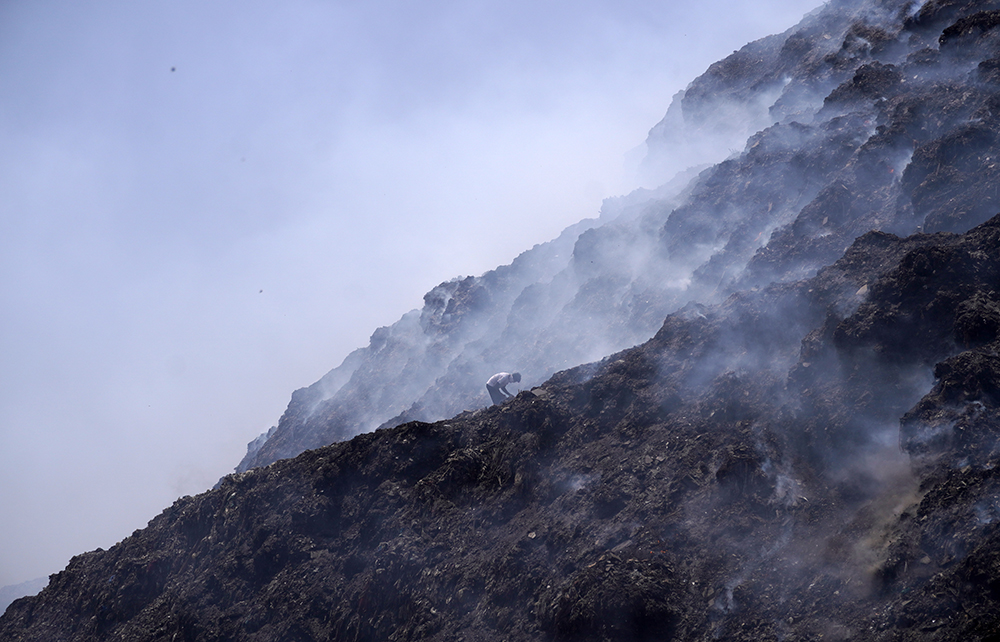Above a foul towering dump in Delhi a cloud of vultures and Siberian black kites fly in hope, ‘careening over the mountainside like some dreadful murmuration’. Here some of the world’s million waste pickers stash water bottles along their route, ‘like climbers making camp’. Oliver Franklin-Wallis concedes that his subject – the dirty truth of what happens to our rubbish – is not appealing.
Much of the unusable, stained tat charity shops receive is sent abroad, whether it’s wanted or not
But he does his best to make that untrue with arresting analogies and metaphors that shine like metal in trash in his account of his extensive travels through what the world discards and disdains. He focuses on the detritrus generated by food and fashion, and he proves a charming guide to environments that range from the depressing to the grotesque – including the mountains of black-bin contents smelling of bad cider, rotting fish and cadaverine conveyed to an English Merf (Material Energy Recovery Facility. Happily there is also Smerf, for special materials).
His access to the places that bury, sort, burn and treat the world’s waste is impressive, considering that hardly anyone in the industry was willing to talk to him. This has always been a secretive business, regardless of its links to organised crime. Tight profit margins, the possibility of riches (a tonne of electronic waste can yield 100 times more gold than a tonne of gold mine ore) and the public’s convenient refusal to pay attention to it all make for the opaque.
The statistics will fill you with despair. Australia landfills half of its organic waste and the US buries or burns more than two thirds. Of all the shocking facts in this book, this is one of the saddest, since this type of waste has its inbuilt disposal system, called rot.
Luckily we have some heroes. These could be the corporate employees at landfills and paper recycling facilities or the jolly gleaners who take the produce discarded at farms – where possibly a third of food waste originates: a fact to consider when you scrape your leftovers into the bin with a dose of guilt. We domestic consumers are at fault, but we are not the only ones.
In Ghana, rivers are clogged with microparticles from the tons of rejected clothing that Global North sends the country. Only a tenth of the donations that charity shops receive are sold through their outlets; the rest, much of which is unusable, stained tat, is sent overseas, whether it’s wanted or not. When in 2016 Kenya, Uganda, Tanzania and Rwanda tried to ban the import of secondhand clothing to protect their own textile industries, the US threatened trade sanctions. Only Rwanda stood up to the bullying.
Much of Franklin-Wallis’s efforts go to puncturing common western assumptions. Buy a T-shirt made of recycled plastic, we’re told; but ‘clothing made from blends of recycled plastics and organic fabrics – cotton and polyester, say – are typically less recyclable than those made from a single fibre’. A bottle can become a T-shirt, but that T-shirt cannot then become a bottle. The organisation Recycle Now lists 28 different recycling labels that can appear on packaging. The most common is the ‘resin code’, three chasing arrows with numbers in their centre, and half of those numbers mean the product is non-recyclable.
In fact the world burns. We burn organic waste, clothes and plastics. In the UK, 48 per cent of rubbish was burned in 2021, an increase of 435 per cent in 20 years. Clothing companies consider incinerating 10-15 per cent of an order (called ‘deadstock’) standard business practice. The Swedish brand H&M overproduced to such an extent that ‘a power station outside Stockholm switched from burning coal in part to burning its clothing’.
Franklin-Wallis does not have answers to this scale of the wrongness, and no one has figured out how to deal with plastic. Companies such as Coca-Cola and Nestlé continually make promises that they fail to keep. ‘Pledges get news coverage. Few ever check later to see if they come true.’
This book is a heck of a check – and for that the author renders a public service as important as a recycling truck or a functioning toilet.






Comments